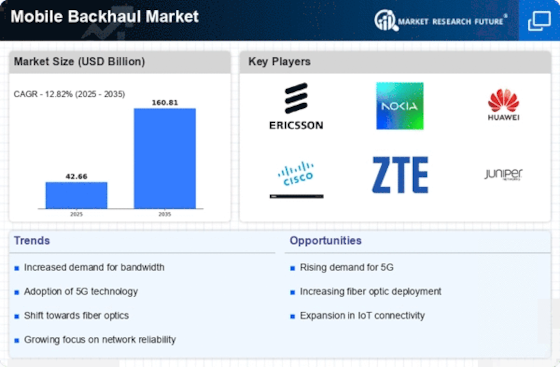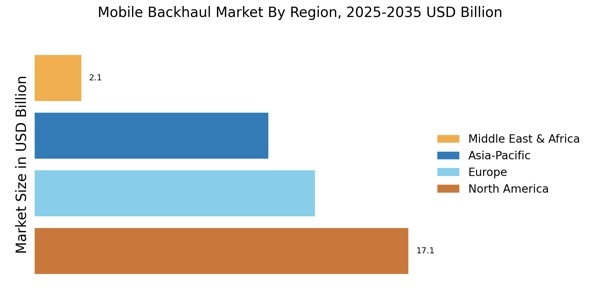Expansion of 5G Networks
The rollout of 5G networks is a pivotal driver for the mobile backhaul Market, as it requires robust backhaul solutions to support its high-speed and low-latency capabilities. The transition to 5G is expected to create a substantial increase in data traffic, with projections indicating that 5G could account for over 50% of total mobile data traffic by 2025. This shift compels network operators to invest in advanced backhaul technologies, including fiber optics and microwave links, to ensure that the infrastructure can handle the anticipated load. Moreover, the deployment of 5G is likely to stimulate competition among service providers, further propelling the Mobile Backhaul Market as companies seek to differentiate themselves through superior connectivity offerings.
Rising Adoption of IoT Devices
The proliferation of Internet of Things (IoT) devices is significantly influencing the Mobile Backhaul Market. As more devices become interconnected, the demand for reliable and efficient backhaul solutions intensifies. It is estimated that by 2025, there will be billions of IoT devices in operation, generating vast amounts of data that require effective transmission to centralized systems. This trend necessitates the enhancement of backhaul networks to accommodate the increased data flow and ensure low latency. Consequently, telecom operators are likely to invest in scalable backhaul solutions that can support the diverse needs of IoT applications, thereby driving growth in the Mobile Backhaul Market.
Government Initiatives and Funding
Government initiatives aimed at enhancing telecommunications infrastructure are playing a crucial role in the Mobile Backhaul Market. Various countries are implementing policies and providing funding to improve connectivity, particularly in underserved areas. These initiatives often focus on expanding broadband access and promoting the deployment of advanced backhaul technologies. For instance, government programs may allocate resources for the installation of fiber optic networks, which are essential for supporting high-capacity backhaul. Such efforts not only stimulate investment in the Mobile Backhaul Market but also encourage private sector participation, leading to a more robust and competitive telecommunications landscape.
Increasing Demand for High-Speed Connectivity
The Mobile Backhaul Market is experiencing a surge in demand for high-speed connectivity, driven by the proliferation of mobile devices and the increasing consumption of data-intensive applications. As users expect seamless access to services such as video streaming and online gaming, telecom operators are compelled to enhance their backhaul infrastructure. According to recent data, the demand for mobile data traffic is projected to grow exponentially, with estimates suggesting a compound annual growth rate of over 25% in the coming years. This trend necessitates the deployment of advanced backhaul solutions, which are essential for supporting the bandwidth requirements of next-generation networks. Consequently, the Mobile Backhaul Market is likely to witness significant investments aimed at upgrading existing infrastructure to meet these evolving demands.
Technological Advancements in Backhaul Solutions
Technological advancements are continuously reshaping the Mobile Backhaul Market, as new solutions emerge to address the challenges of increasing data traffic and network complexity. Innovations such as software-defined networking (SDN) and network function virtualization (NFV) are gaining traction, enabling more flexible and efficient backhaul architectures. These technologies allow operators to optimize their networks, reduce operational costs, and enhance service delivery. Furthermore, advancements in microwave and millimeter-wave technologies are providing alternative backhaul options that can be deployed rapidly and cost-effectively. As these technologies evolve, they are likely to drive further growth in the Mobile Backhaul Market, as operators seek to leverage the benefits of modernized infrastructure.

















